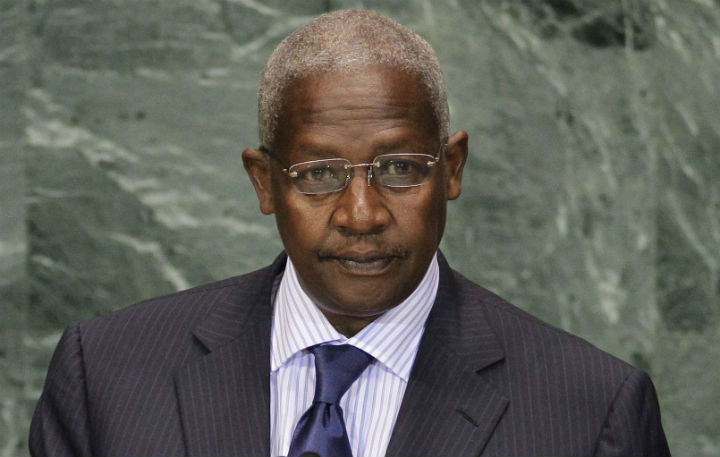The next head of the United Nations General Assembly not only represents a country that has harsh anti-gay laws, he’s a proponent of those laws as well.

Sam Kutesa, Uganda‘s foreign minister, was officially named the next president of the General Assembly (UNGA) after weeks of criticism lobbed at the world body and calls to halt the appointment from lesbian, gay, bisexual and transgender rights.
“Just looking at the fight against homophobia and trying to get worldwide recognition, that gay and lesbian rights are human rights, it’s very worrying, extremely worrying,” said Errol Mendes, a professor of constitutional and international law at the University of Ottawa.
In the lead up to the vote at UN headquarters, in New York, thousands signed an online petition to demand the U.S. forbid Kutesa’s entry into the country. The petition also urged U.S. Secretary of State John Kerry and U.N. member states to block the controversial Ugandan figure from taking up the post, The Associated Press reported.
READ MORE: 2 Ugandans charged over gay sex (May 7)
Mendes said the position of UNGA president isn’t as significant a role as being on the UN Security Council–it’s largely an administrative role. But, Kutesa’s election is symbolic of something much more worrisome, he explained.
“Given the fact that the UN is also tasked with promotion of human rights… it’s very worrying that now you have this attempt to rollback some of the accepted norms and accepted progress on gay and lesbian rights,” he said in a phone interview with Global News on Wednesday.
Kutesa, a 65-year-old lawyer and member of Parliament, was unanimously named Africa’s choice for the role last month and won the election by acclamation on Wednesday.
The position rotates annually between five geographic regions and each gets to choose their nominee. The outgoing president is John W. Ashe from Antigua and Barbuda, a part of the Latin America and Caribbean group.
“What really worries me about that is the fact that you see an arc of outright prejudice, outright incitement of hatred of gays and lesbians, running all the way from Russia into Africa, with many countries now starting to put together anti-gay and lesbian laws,” said Mendes.
He wondered if Kutesa’s appointment has “a larger geopolitical significance,” one that could make matters worse for LGBT people.
He said Russia’s defiance of the international community by enacting what’s been called an anti-gay propaganda law last year, ahead of the Sochi Olympics, may have emboldened governments that discriminate against LGBT individuals. Kutesa’s appointment could add fuel to that fire.

Get daily National news
In his own defence on Wednesday, Kutesa said he was not homophobic and has “no problem” with gay people as long as they “respect the privacy.”
Kutesa also denied accusations of corruption.
Foreign affairs minister under President Yoweri Musaveni intermittently since 2005, Kutesa is also alleged to have been involved in corrupt business dealings and had to resign from a ministerial post following charges he abused his office. He was accused in 2011 of taking bribes from foreign countries, according to The Associated Press. He was reinstated, as foreign minister, in 2012 after the constitutional court called the trial off.
READ MORE: Uganda tabloid publishes list of the country’s ‘top’ homosexuals (Feb 25.)
Mendes said there will of course be international criticism of Kutesa’s presidency from countries in Europe, Latin America and, of course, the United States and Canada.
The UN Human Rights Council and even UN Secretary-General Ban Ki-moon have repeatedly declared LGBT rights are human rights and laws criminalizing same-sex relations, such as in Uganda, are “inherently discriminatory and incompatible with existing international human right standards.”
The office of Canada’s Foreign Affairs minister expressed its unhappiness with Kutesa becoming UNGA president.
“It is deeply disappointing to have a member of a government with a track record of violating the fundamental human rights of its citizens and the dignity of all Ugandans elected as President of the General Assembly,” Adam Hodge, press secretary for Minister of Foreign Affairs John Baird, said in a statement to Global News Wednesday evening.
“We will continue to seize every opportunity to press the Government of Uganda to protect the human rights of all Ugandans regardless of their sexual orientation,” Hodge said.
That poses a bit of a problem in Mendes’s eyes: He said Canada’s voice on the world stage isn’t as powerful as it once was.
“The fact that very little, if anyone, will pay attention to anything Canada says on this matter is indicative of the fact Canada has been bad-mouthing the UN from Day 1,” he said.
Baird has issued several statements about Uganda’s oppressive laws, that came into effect in February and made homosexuality an offence punishable with lengthy prison sentences or even life imprisonment.
READ MORE: Uganda slapped with aid cuts over anti-gay bill (Feb. 27)
But, Mendes suggested Baird’s words fall on deaf ears. He pointed out Baird spoke to a mostly empty room last September when he addressed “sexual freedom” in a speech during the 68th regular session of the General Assembly.
With files from The Associated Press








Comments